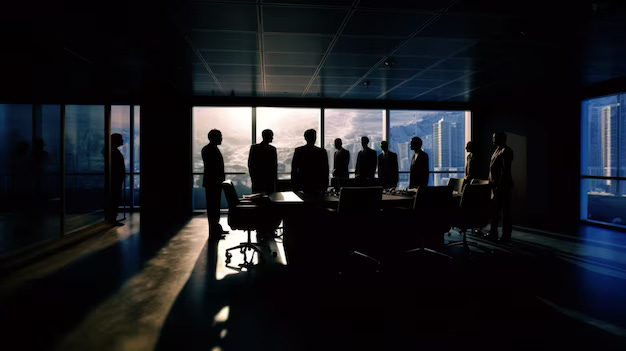The Gang of Eight: Briefed Late, Blamed Early!
The only club where knowing late still counts as being informed—sort of.
The Gang of Eight was supposed to be Congress’s classified conscience—the bipartisan fire alarm when secrecy runs too hot. Instead, they're often handed the extinguisher after the blaze. From warrantless wiretaps to bombs over Iran, this isn’t oversight. It’s after-the-fact theater wrapped in euphemism and sealed with a handshake.
If democracy dies in darkness, this might be where they dim the lights.
Is the he Gang of Eight: Oversight or Optical Illusion?
In theory, the Gang of Eight is where the buck stops. Eight high-ranking members of Congress, sworn to secrecy and entrusted with safeguarding democracy through classified briefings. In practice? They're often the last to know and the first to be blamed. It’s oversight by invitation—when the executive branch bothers to send one.
This ultra-exclusive club includes the top House and Senate leaders plus the chairs and ranking members of the Intelligence Committees. Think of it as VIP access to America’s deepest secrets—except sometimes the velvet rope stays up, and no one tells them there’s a party happening behind it. Supporters say the Gang is a compromise between transparency and national security. Detractors say it’s ceremonial oversight: plausible deniability wrapped in bipartisan packaging.
A Brief History of Controlled Disclosure: The Gang was born out of a post-Watergate attempt to keep the intelligence community from freelancing its way into scandal. Congress wanted oversight. The executive wanted plausible deniability. What they got was 50 U.S.C. § 3093(c)(2)—a law that lets the president limit notification of covert actions to just this gang “in extraordinary circumstances.”
Translation? If a president feels like sharing, great. If not, well, “extraordinary” is conveniently undefined.
Who’s in the Room? (And Why It Doesn’t Always Matter).
The Gang of Eight includes the four congressional leaders and the four top Intelligence Committee members. That’s two parties, two chambers, and—allegedly—one check on unchecked power.
But in reality? They often get briefed after the bombs drop, the program leaks, or the apology tour begins. They’re there to say “oversight happened,” even if all they got was a folded memo and a handshake. It’s governance by press release.
Secrecy’s Favorite Excuse: Extraordinary Circumstances:
Presidents love this one. Got a drone program targeting U.S. citizens abroad? Extraordinary. Running a surveillance dragnet across the country? Sounds pretty extraordinary. And once that card is played, full congressional notification becomes optional.
The irony? “Extraordinary” has become business as usual.
When Oversight Fails (a.k.a. Tuesdays):
From warrantless NSA surveillance to black-site interrogations, the Gang of Eight’s history is riddled with late briefings, sketchy details, and after-the-fact justifications.
Fast forward to the 2025 Iran strikes. Missiles hit Fordow, Natanz, and Isfahan—nuclear sites, not parking lots. But Secretary of State Marco Rubio assured reporters, “We are not declaring war in Iran.” Sure. We’re just dropping bombs for... sport?
Congress wasn’t briefed beforehand, and the Gang of Eight got the memo after it was all over. It wasn’t oversight. It was cleanup.
Even the 2006 Congressional Research Service warned that limiting briefings to the Gang “would appear to be inconsistent with the law” requiring full committee notification. But who's counting?
Conclusion: The Gang’s All Here—But the Plot’s Already Over
The Gang of Eight should be the red light before the government runs the stop sign. But too often, they’re standing at the corner with a broken walk signal. If you squint, the system still looks like it’s working. But what we’re left with is ritual, not restraint.
Rubio’s “not a war” line is more than diplomatic spin—it’s a masterclass in how to duck constitutional responsibility with a straight face. Because if you can redefine warfare with enough semantic gymnastics, why bother informing Congress at all?
Secretary of State Marco Rubio with Maria Bartiromo of Fox Business Sunday Morning Futures
QUESTION: Joining me now in his first interview since the U.S. action is the Secretary of State of America, Secretary Marco Rubio. Mr. Secretary, thank you for being here. Are we now at war with Iran?
SECRETARY RUBIO: No, we’re not. This is not a war against Iran. This is – this is very simple. Sixty-seven days ago, the President of the United States sent the Iranians a letter and it said you’re not going to have nuclear weapons, you’re not going to have a militarized nuclear program, let’s negotiate, I want to do this diplomatically, I want to do this peacefully.
I guess we are/aren’t at war. So it doesn’t matter as far as they are concerned.
So we circle back to the question: is the Gang of Eight a meaningful check on executive power—or the most exclusive spoiler-alert club in Washington? Either way, when accountability is optional and language is flexible, democracy becomes the most classified secret of all.
References
Congressional Research Service. (2006, January 18). Presidential authority to conduct warrantless electronic surveillance to gather foreign intelligence information. https://sgp.fas.org/crs/intel/m010506.pdf
National Security Act of 1947, 50 U.S.C. § 3091–3093 (as amended). https://uscode.house.gov/view.xhtml?path=/prelim@title50/chapter36/subchapter3&edition=prelim
Wikipedia contributors. (n.d.). Gang of Eight (intelligence). Wikipedia. Retrieved June 22, 2025, from https://en.wikipedia.org/wiki/Gang_of_Eight_(intelligence)
Ballotpedia. (n.d.). Gang of Eight. Retrieved June 22, 2025, from https://ballotpedia.org/Gang_of_Eight
Goddard, T. (n.d.). Gang of Eight. Political Dictionary. Retrieved June 22, 2025, from https://politicaldictionary.com/words/gang-of-eight/
CellyBlue-I Do Know This!






